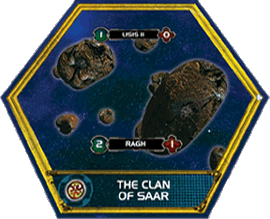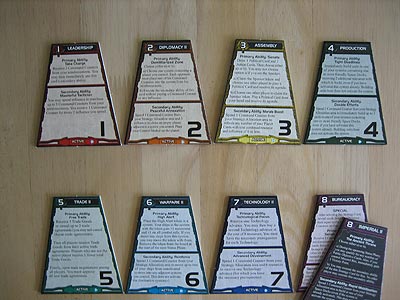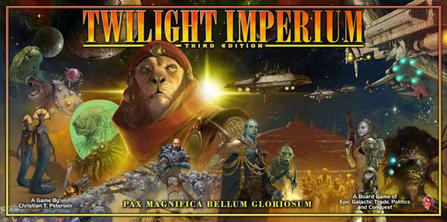One nerd-issue I deeply care about I haven't written about at all on Nerdstream yet, which is something I intend to remedy. So, let's start a new series of boardgame reviews that present you some of my all-time favorites. One warning in advance: the boardgames I am to present to you aren't exactly the family-friendly stuff. They aren't reaching the complexity levels that some tabletops and cosims do, but they usually run several hours and require a good understanding of pretty complex rules. That's being said, let's launch into the first issue of the new series and review a special favorite of mine: Twilight Imperium 3rd Edition, published by Fantasy Flight Games.
The object in Twilight Imperium is pretty simple: become the emperer of the galaxy. You achieve this goal the usual way, by accumulating 10 Victory Points (VP), which makes everyone else instantly recognize you as overlord. You know, just like real live. Live would be easier with Victory Points, though. You can achieve these VP by completing Objectives - public ones that everyone can achieve and secret ones only applicable to you. These range from simply spending a certain amount of resources to occupying the enemy home system.
 |
| Your table won't look that neat while playing. |
The
game takes place in a galaxy that is built by the players at the
beginning of the game. Each player receives a certain numer of
"systems", hexagonal tiles containing zero to three planets, which have
to be placed to form the galaxy. This part of the game already defines
much of the future gameplay and ensures large replayability since no two
games will ever be the same. You then choose a race, which is an important decision: every race comes with a special ability (or several), and they deeply affect the way the game is played. Gaining a bonus in combat opens up other choices than researching more efficiently.
 |
| Home system of the Clan of Saar. |
The gameplay is divided into three phases: at first, in the Strategy Phase, everyone selects a Strategy Card. Those cards give you a unique ability for the remainder of the round that influences your playstyle. You might research a new technology, or you may boost your fleets. You may produce really many ships, or you may conduct some diplomacy. You are the only one who gets to do that this round (to offset this, there are secondary effects that the others can tab into). The choosing of those Strategy Cards is an important part of the game, because you have to shape your strategy after it. Is a mighty opponent threatening you? Time for some diplomacy, denying him access. Do you need to bolster up your forces? Use production. And so on.
 |
| Plastic ships. Lots of plastic ships. |
After this choosing phase comes the Action Phase. Here, the players take turns doing stuff. They can activate systems to move units or produce them, they can use the ability they selected in the prior phase, they can play cards that give them a one-time-effect or they can pass. When all players passed, the third phase starts, in which points are scored and some bureaucratic stuff happens, like resetting all the markers.
 |
| Lot of things going on. |
The game gains its intimidating complexity by the sheer range of options. There are more technologies available than anyone can ever research, and they're interdependent, which makes smart choices mandatory. There is a political system in which you vote for laws that can alter the game mechanics (closing the wormholes, for example, that connect parts of the board). Action cards allow you to mess up enemy plans, and the racial abilities require different fleet layouts. Some races want swarms of small fighters while others count on giant Dreadnoughts. There are leaders for each race, providing additional abilities. Flagships can be built and mercenaries hired. Planets that are unexplored can contain nasty surprises, as can empty space. It all depends, and your choices matter.
 |
| The tech tree. |
Of course, this provides a large entry barrier to new players, at least at first glance. However, since this is a full-blown strategy game with diplomacy playing an important part, usually newcomers aren't just stomped, but cultivated as buffers or helping hands. I know there are players that detest that kind of meta-gaming, but such strategy titles aren't for them anyway, so I don't regard this as a big problem.
 |
| The Strategy Cards. |
My joy over this behemoth of a board game doesn't come totally unimpaired, though. The base game contains some rules and abilities that are badly broken and only partially repaired by the two expansions available (that are really, really recommended if you decide to pick it up). Luckily, the game is very open to using house rules. Many stuff in there is optional and can be used - or not. You can also alter many rules you don't like and still have a functioning game. I heavily houseruled the game myself (you can find my houserule compendium on Boardgamegeek).
 |
| Race card for the L1z1x Mindnet, with a quick rule overview. |
So, who should check the game out? If you are not deterred by complexity and really like to feel a thematic game in which you can conquer and dominate a galaxy all the while really feeling like you do so, the game is for you. I know I do. I loved the game enough to write a huge strategy guide for it after all.

U svojoj ulozi radim s odjelima za osiguranje, obradu, financiranje i drugim odjelima. Svaki od ovih timova dolazi s ogromnim bogatstvom znanja. To mi omogućuje da steknem više znanja o svojoj ulozi i pružim članovima bolje iskustvo. Dobijte svoju financijsku slobodu od nas danas. Dugujete li, trebate zajam, brz i pouzdan, ovo je mjesto za dobivanje vjerodostojnih zajmova. Nudimo poslovne zajmove, studentske zajmove, stambene zajmove, osobne zajmove itd. Kamatna stopa zajma od 3%. Kontaktirajte nas danas. Imate priliku dobiti novčani zajam u iznosu od 2000 (€$£) – 5.000.000 – 100.000.000 (€$£) s mogućnošću otplate od 1 godine do 45 godina bez jamstva nekretnine. Viber: +385915608706 WhatsApp: +385915608706 E-pošta: hybridalliantcreditunion@gmail.com © 2025 Alliant Credit Union 11545 W. Touhy Ave., Chicago, IL 60666 Usmjeravanje #271081528
ReplyDelete